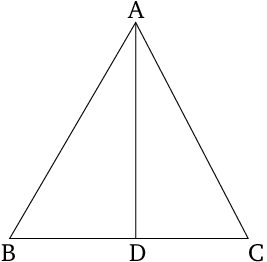In acute-angled triangles, the square on the side subtending the acute angle is less than the (sum of the) squares on the sides containing the acute angle by twice the (rectangle) contained by one of the sides around the acute angle, to which a perpendicular (straight line) falls, and the (straight line) cut off inside (the triangle) by the perpendicular (straight line) towards the acute angle.

Algebraically, this proposition states that in an acute triangle \[AC^{\,2} = AB^{\,2} + BC^{\,2} +2\,BD\, BC.\]
Note that this is a special case for the law of cosines: \[AC^{\,2} = AB^{\,2} + BC^{\,2} -2\,AB\, BC\,\cos {ABC},\] when $ABC$ is an acute angle, since \[\cos {ABC} = BD / AB.\]
Proofs: 1
Sections: 1